A Conversation with The Commish
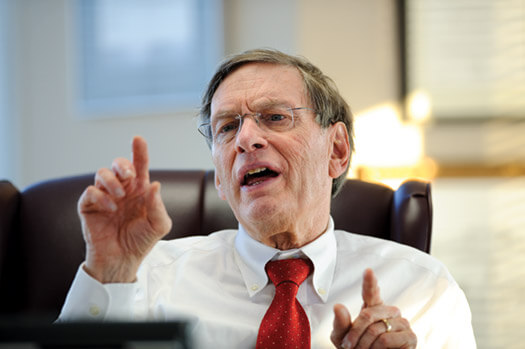
Before moving forward on any change to the game of baseball, Commissioner Bud Selig likes to look back. “If (we) only learned as much from history as there is to be learned,” he says, “(we) wouldn’t be making the same mistakes over and over again.”
Bud Selig looks back on his career, and ahead to a return to Madison, considering it all through “the retrospect of history.”
In early November, after the San Francisco Giants beat the Texas Rangers in the World Series, Allan H. (Bud) Selig ’56 completed his eighteenth season leading Major League Baseball. He’s declared that when he finishes his twentieth — at the end of 2012 — he will hang up his spikes and retire … sort of.
Instead of entering a life of peaceful contemplation, Selig will take up an office at the UW, and add an extra inning (or two or three) to a career that has spanned auto sales, sports franchise ownership, and serving as grand poobah of America’s national pastime. A week after the World Series’ final game, Selig sat down with On Wisconsin to discuss his past and future.
On Wisconsin: Now that the season is over, I imagine this must be a slow time for you.
Selig: There is no slow time. Maybe the week between Christmas and New Year’s, if I’m lucky and nobody gets in trouble. That’s about it. Today, in fact, when you leave, I’ve got a ton of stuff to do just to finish this day. And tomorrow, late in the day, I leave for Orlando [for the annual team owners’ meeting]. … I’m very busy.
What will you be discussing?
Nothing really critical. I’ll have all the [teams’] general managers down. We’ll talk about labor, we’ll talk about economics. We’ll talk about various things. We’re talking about the expansion of instant replay. I have a special committee of four managers — Joe Torre, Mike Scioscia, Jimmy Leyland, and Tony LaRussa, plus four general managers, four owners, [newspaper columnist] George Will, and [former player and manager] Frank Robinson. It’s a very interesting group.
Instant replay is a hot-button issue for many fans — some see it as a way to improve the game through technology; others see it as trampling on baseball’s traditions. How do you decide when to make a change?
I often say to the clubs, and I’m going to say it again when I see them in Orlando, if they only learned as much from history as there is to be learned, they wouldn’t be making the same mistakes over and over again.
History is important to you.
I was an American history and political science major, and you bet it helps. In all the things I do as commissioner, I look back. I do enormous research and have our people do it, and history has been a great teacher for me.
I never dreamed [when I was young] that I would own a baseball team. I thought I would be a professor of history — American history, particularly from … the Civil War to the present.
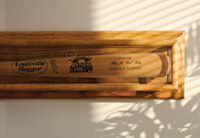
In all the things I do as commissioner, I look back. I do enormous research and have our people do it, and history has been a great teacher for me. I never dreamed when I was young that I would own a baseball team. I thought I would be a professor of history. Photo: Jeff Miller
What stopped you?
My father asked me to go into the family business. He said to me at the time, “Give me a year.” And I was very close to both my parents, and when your father asks you to give him a year, you give it. And I did it with some trepidation.
But I say my father did me a great favor, though I often wonder how it would have been to be in Madison as a history professor — a lot different than the life I’m leading.
The family business was auto sales, wasn’t it?
Yeah, it was auto retail, leasing, real estate — it was a whole series of things. We were the largest Ford dealer in the state of Wisconsin, the second largest leasing company in America — automobile leasing, that is. My father was one of the founders, actually the second or third person in America who got into the automobile-leasing business. It took unbelievable vision, and he was really proud of that.
Auto dealing is a long way from baseball — where does your love for the sport come from?
My mother, in particular, was a huge fan of the [Milwaukee] Braves, and before that of the Cubs, actually. … I was a Cub fan and a Yankee fan because I was a Joe Dimaggio fan from about 1945 to ’53.
And you translated that into an ownership stake with the Milwaukee Braves.
[When the Braves] went public in 1963, I was the largest public shareholder. But I didn’t control the fate of the Braves. I certainly would have [kept them in Milwaukee] if I could. It was a heartbreaking story. … I remember the last game [the Braves] played here — people were crying.
But my father, when I got into baseball, always worried about what would happen to the family business.
And then you bought the Brewers.
On the night of March 31, 1970, we bought a team out of bankruptcy court in Seattle — the Seattle Pilots. And I remember that night; I couldn’t believe it had happened, because the odds, I realize now, the odds were really stacked against us. Of all the things I’ve been through, I’ll always be proudest of bringing baseball back to Milwaukee. And I think only in the retrospect of history — one of my favorite phrases — do I realize that the odds were really against us.
What did the Pilots cost?
Ten point eight million dollars — the most expensive team at that point. George Steinbrenner bought the Yankees two years later and paid less. He used to kid me about that for many years.
Later, what did the Brewers sell for?
I had become commissioner — acting in ’92 and full time in ’98 — and it was $223 million. My father worried when we bought them we had paid too much money and it was terrible. But it all worked out perfect.
You say the odds were against you — how so?
Baseball didn’t want to come back here [after the Braves left]. It was really tough. [The Major Leagues] passed us on two expansions. … But we stuck to it, and we just kept trying. We tried to get a team from 1965 on, and I traveled all over the country, just a kid.
We tried first to get an American League expansion team, [but] Art Allen [then owner of the White Sox], told me they had expanded to [California] and to Seattle. And then the National League, we thought we had that, and it was a real fight. They expanded to Montreal and San Diego. So it taught me a lot about tenacity, taught me a lot about being able to stick to something, because I really believed it was the right thing.
A college friend of yours owns the Oakland A’s, right?
Lew Wolff [’57] — he and I were fraternity brothers.
And Herb Kohl ’56, U.S. senator and owner of the Milwaukee Bucks basketball team — he’s a friend, too.
We were kids together in Milwaukee.
Did you all know you’d end up owning major sports franchises?
Never dreamed of it — never talked about it once.
So how did you end up with the Brewers?
It happened because the Braves left. We were trying to buy a team. I could tell you each one. We failed on expansion. We had a group put together, a wonderful group. Some Madison people, by the way — Duane Bowman, Oscar Mayer. Oscar Mayer was a great partner of mine. He was a wonderful, wonderful human being and a great man. Anyway, we tried to buy the White Sox and thought that was done [but the other Major League owners blocked the sale]. Then all of a sudden, Seattle was in trouble — bad ballpark, bankrupt. After five and a half years, if we didn’t buy the Seattle Pilots, it probably ends right there. There was no other team for sale, and I was trying to keep the group together. Fortunately, it worked.
Why not just buy into another team and leave it where it was? Why was it so important to you to bring a team back to Milwaukee?
What people sometimes fail to understand is that a Major League team really serves as a great galvanizing force. … I saw what happened here in ’82 [when the Brewers went to the World Series]. It was just unbelievable — the mail I got, people telling me how much this meant to their family. So … yes, I believe there’s an economic return. We’ve had economic analyses done. But I’ve always said that the sociological value of having a Major League team is more important.
You were quite a young owner then — did you feel intimidated?
The first meeting I ever went to, in April 1970, right after we got the team, [then-commissioner] Bowie Kuhn called, and he said come on in, and he put me right between [Chicago Cubs owner] Phil Wrigley and [St. Louis Cardinals owner] Gussie Busch. And that was pretty good for a thirty-five-year-old kid.
What was the meeting about?
It was all about labor, and they were mad. Gussie was slamming his cane on the floor and said, “Not another dime for those SOBs,” and so on and so forth.
What did you learn from that?
Well, my mentor in life was my father — and mother to a lesser extent, but both of them. My mentor in baseball was a man named John Fetzer, who was the owner of the Detroit Tigers for many, many years — a great man, a visionary. … And he took me under his wing in 1970. I must say, my affection for Mr. Fetzer, as you can tell — to this day, I quote him in every meeting. He taught me the basic lesson that so many in baseball and sports never learn: the sport transcends all of us. The only way you should ever decide anything is on what’s in the best interest of baseball.
One day, back in 1971 … he hadn’t voted in his club’s best interest. I don’t remember what the issue was. … Here was a man who had a great team — they’d been world champions. They had Al Kaline and Willie Horton and Norm Cash and Bill Freehan and Mickey Lolich. And I said to him, “John, why would you do that?”
And he said, “Buddy, I want you to remember this. Now, you’re going to be in this sport for a long time. You always do what’s in the best interest of the game, not what’s in the best interest of the Detroit baseball club or the Milwaukee baseball club.”
And it’s a very tough lesson, but he was so right. And I would like to think today that this sport has gone on to bigger and better things because that’s what we do — at least what most people do.
Which owners today are exemplary?
As commissioner, I don’t like to pick out owners. There’s a lot of really good owners, and they love baseball, [though] sometimes people are cynical about that. But [Chicago White Sox owner] Jerry Reinsdorf and I, for instance, will play baseball trivia all the time. I can call him up right now, and we can talk about the shortstop for the 1952 Dodgers — he was a Brooklyn kid, obviously — or who played for the Giants, and it’s fun.
That was Peewee Reese, right?
That’s Peewee Reese. Billy Cox was the third baseman, Jackie [Robinson] the second baseman, [Gil] Hodges the first baseman. [Roy] Campanella and [Carl] Furillo, [Duke] Snyder, and you can get into [Gene] Shotgun Shuba or Gene Hermanski. I’m sorry — that’s the history major in me. I remember a lot of junk, none of it very important, but I remember it anyway.
In 1992, your predecessor, Fay Vincent, resigned. At the time, you were one of twenty-six owners. How did you end up the one selected to succeed?
I was on the executive council, and the day Fay Vincent resigned, we were going to St. Louis for meetings. But I was shuttling back and forth, because Robin Yount was going for his three-thousandth hit, and I wasn’t going to miss that. I started getting calls the night before from members of the council, who said, “Bud, you’ve got to take over. … And at first I was sort of stunned. But I thought it was a short two to four months. My wife often reminds me of that, because I told her two to four months, and here we are twenty years later. So it was really the owners who asked me, and you’d have to ask them [why]. I think Mr. Fetzer had raised me properly, and I was deeply involved in baseball at every level, and I guess they had confidence.
You’ll have served twenty years as commissioner in 2012, and then you’re going to retire, right?
I am. Now, there are many people who don’t believe that, including my wife and family and most owners. They don’t think I am, but I intend to spend a lot of my time in Madison. … I’ll have done this job twenty years, and anybody who understands this job [knows] that’s a long time — other than Kennesaw Mountain Landis, [I’ll have done it] longer than anybody else.
What will you do in Madison?
I plan to write a book and teach — sports in modern society, maybe 1960 to the present, from the time I’ve done it or even before. Sports have played a very dynamic role in society, transcending just the sport itself, and that’s what I’d like to teach.
Transcending — how so?
Think about one thing: Jackie Robinson, April 15, 1947. Long before Brown v. Board of Education, before Harry Truman desegregated the United States Army, long before the Civil Rights movement, Jackie Robinson played in the big leagues. Anybody that year who was there will never forget it. It became baseball’s proudest, most powerful moment, having nothing to do with baseball. And it showed what sports can do.
You mentioned Kennesaw Mountain Landis, baseball’s first commissioner. Which of your predecessors do you look to for inspiration?
I have great admiration for all of them. I loved Bart Giamatti, who was only there for five months. He passed away suddenly. He and I were extremely close. … I liked Peter Ueberroth. Bowie Kuhn and I were very close. You know, I came into the business when he was commissioner … And I’ve studied Kennesaw Mountain Landis, too.
They all had remarkably different [styles], but then life was different. [Landis] could be a dictator. They had no union. There was no television. It was a whole different world. We’re living in a much more complex world.
… I haven’t seen Fay Vincent now in fifteen or eighteen years. … The owners voted no-confidence in him, and I don’t want to get in — I’ve never commented on Fay.
You mentioned Jackie Robinson coming into the leagues, which happened under Commissioner Happy Chand-ler. What do you consider the greatest legacies of your term?
Changing the economic structure of the sport. In the ’90s, with all the heartache [of the 1994 players’ strike and canceled World Series], there wasn’t a nickel of revenue sharing. This year there’ll be $450 million. … When I took over, the gross revenue of the sport was $1.2 billion. This year it’s $7 billion.
Labor peace played a role in that. … I had been chairman of the player relations committee, and we had eight work stoppages since I had come into baseball. … And I said to myself after ’94, we’ve got to quit doing what we’ve been doing and making those mistakes. Don Fehr, the head of the [players’] union, and I talked about that a lot. We’ve now had sixteen years of labor peace. Nobody at the time thought that was possible. It may be the most important single reason why this sport is in its golden era, doing better than anybody dreamed, having revenues, attendance, everything better than anybody thought — because we did learn from our mistakes in history.
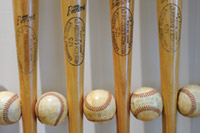
We’ve now had sixteen years of labor peace. Nobody at the time thought that was possible. It may be the most important single reason why this sport is in its golden era, doing better than anybody dreamed. … We did learn from our mistakes. Photo: Jeff Miller
What kinds of mistakes?
Well, there were a lot of things. The owners fought with the owners — I knew I had to correct that. The owners fought with the commissioner. I hoped I could [correct] that, and I have. The anger between the two parties was palpable at all points — the owners and the players’ union. And I worked hard at that. … [It was] painful for all of us, starting with me. All the clubs, everybody — look, the American public, and the Canadian public, had gotten tired of people fighting. That’s all we did. That’s why the sport was stuck in neutral. And somebody had to study what had happened for three or four decades and say, we’ve got to learn from this. That’s what I did.
Combating steroid abuse has also been a major issue during your tenure.
No question about it. But I tell you what I’m proudest of: steroids were not a baseball problem; steroids were a societal problem. We banned steroids. We banned amphetamines. We’re a leader in the search for [how to detect use of] human growth hormone. We have the toughest testing program in American sports. … You talk to every trainer, as I do, or team doctor, they tell you they’re stunned at how different it is. My minor league program is about to enter its eleventh year, so every great young player we have in the sport, and we have a lot of them, they’ve been tested their whole career. This is a sport that never had a drug-testing program before. Even in the cocaine era of the ’80s, they couldn’t get a drug-testing program. So I’m very proud of the way we’ve handled this.
What issues will your successor face?
We need to grow. The sport has tremendous potential for international growth. And just to keep us moving in the direction we’ve been moving in the last five years. When you think of the recession, the worst economic downturn since the Great Depression, and this sport continues to grow in a remarkable way. …
But there are a lot of business challenges, too. We’re doing great, but we have a lot ahead of us. And a lot of competition — oh, a lot of competition. Other sports — in this world we live in, there’s a lot of competition for the entertainment dollar. You bet. [But] I don’t think anything threatens us. I think this sport is so woven into society and so popular today that I’m not worried about being threatened. I’m just worried about continuing growth. I don’t think anything can threaten us, if we do our work.
Will you miss the perks of your job?
Perks — my greatest nights are when I can be at home on my satellite and watch all fifteen games [going on that day], and that’s great. I would say I went to four or five Brewer games this year, and I went to Wrigley Field, and I go to some other places. But not much. I’m here all day. …
Obviously I love the games, but let me say this to you: for me, the thing that gives me the greatest satisfaction is to think I was fortunate enough to be the custodian of the national pastime for my generation. When I have tough days, that’s what I think about.
Interview condensed and edited by On Wisconsin senior editor John Allen, who’s well aware that Gene Hermanski didn’t play for the Dodgers in 1952 — he’d been traded to the Chicago Cubs in 1951 for Andy Pafko. There’s no need to write and correct us on that point, Andy Pafko fans.
Published in the Spring 2011 issue

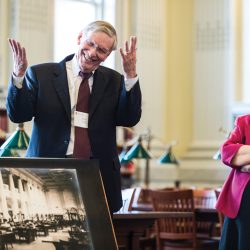
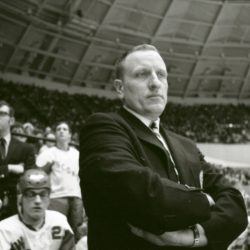
Comments
Phil Hochberg March 23, 2011
If John Allen knew Hermanski did not play for the Dodgers in 1951, he should have known that Shotgun Shuba’s first name was “George,” not “Gene” and that the White Sox owner spelled his last name “Allyn,” not “Allen.” prh